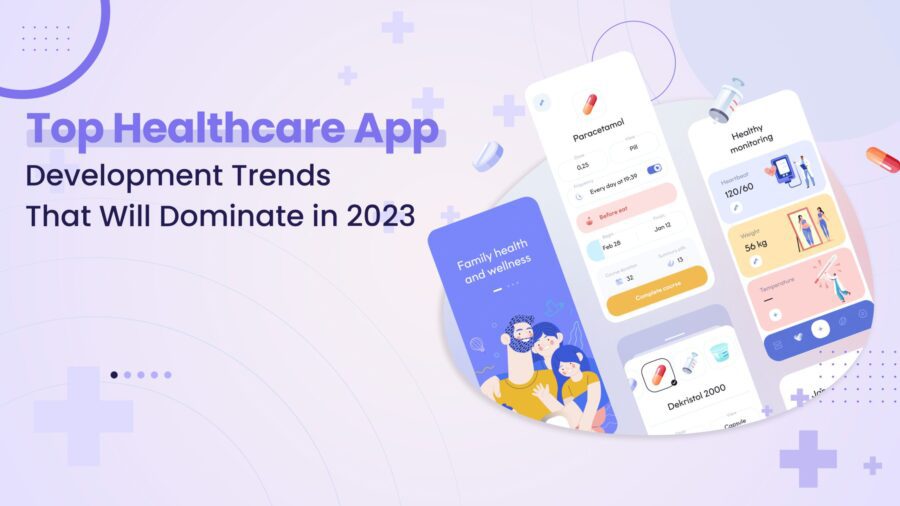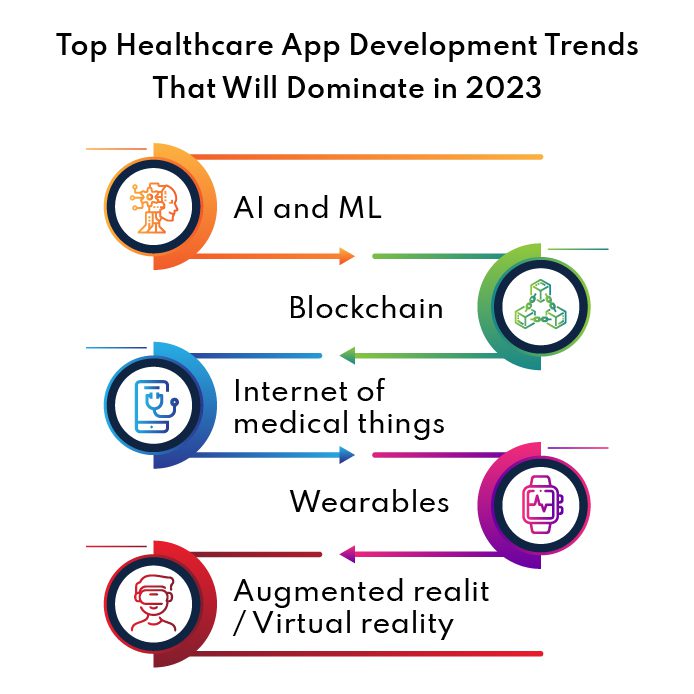
The world is going digital at a very fast speed. From retail shops to the cab industry to banking, all are changing and so is the healthcare industry. We can see a huge difference in the industry in terms of technology compared to ten years back. But there is a long way to go for the healthcare industry, especially after the pandemic, with the huge stress that came into the world economy. The shift from traditional to digitalization brought a massive need for the healthcare industry to adopt new technology.
Today, from practitioner to patient, all will be benefited from the upcoming healthcare app developments trends in 2023.
But, before moving further let us see why healthcare apps are crucial in this digital time.
Impact of Mobile Apps in the Healthcare industry in these modern times
With the use of mobile applications, healthcare app development is a rapidly growing trend. Mobile apps are quickly becoming an easy way for healthcare providers, patients, and other stakeholders. Mobile apps are time savers and provide ease, better communication, and more efficient care delivery for those in need.
Today’s mobile apps are designed to be easy to use, making it easier for users to get things done and saving them time and effort. Additionally, they are designed to safeguard patient data and information. This eliminates the requirement for paper records and gives healthcare providers access to their patient records at any time and from any location.
Access to healthcare services has been revolutionized by the use of mobile apps. From scheduling appointments, contacting providers to look up health information, and even monitoring vital signs remotely, all can be done efficiently on mobile apps. Reminders to take medications, order lab tests, and view test results are some features you can get in mobile apps. Medical records can be quickly shared between providers and insurers, resulting in a fast process with no unwanted delays.
Healthcare app development appears to have a bright future. Mobile apps will become an even more important part of the healthcare industry as technology continues to advance. One can opt for the mobile app development services provided by the companies to develop healthcare apps for medical institutions and other stakeholders. AI-driven applications that analyze data for early medical issue detection, telemedicine applications that enable remote consultations with physicians, and virtual assistant applications that guide users through the medical process are all likely to advance. The options are truly limitless.
Top Healthcare App Development Trends That Will Dominate 2023
Now, we will look at the top healthcare app development trends that will dominate the healthcare industry in 2023.

1. AI and ML
In the healthcare sector, AI and machine learning are becoming increasingly crucial technology for improving patient care and making the healthcare system more efficient.
Artificial intelligence and machine learning are being used to process large amounts of data of patients quickly and accurately, making it easier to make decisions based on authentic observations. AI and machine learning can also be used to help automate processes, reducing the amount of time and manual labor required for complex tasks.
As AI and machine learning continue to become more common in the healthcare industry, new trends are coming that will shape the future of healthcare application development. AI and machine learning can prove beneficial in diagnosing patients efficiently and accurately and giving doctors the best treatment for every particular patient.
Additionally, AI and machine learning are being used to create virtual bots that can interact with patients and answer their queries. Finally, a lot of healthcare providers are looking into using voice-based interfaces that let patients consult their doctors.
2. Blockchain
Improved data accuracy and security are just two of the many benefits that blockchain technology can provide to the healthcare industry. It can also give patients more control over and privacy over their data, letting them own their medical records and making sure they are safe and easy to access. It could also be used to integrate administrative procedures like the processing of claims and the verification of medical records.
In the coming time, blockchain technology could be used for various tasks such as electronic medical records management, drug tracking systems, AI-driven diagnosis and treatments, virtual consultations, and more. This will totally change the healthcare industry, the quality of care will improve, and it will be more efficient and cost-effective. It’s no wonder why so many organizations are already investing in this technology.
We are going to witness more applications being developed in 2023 with the technology of blockchain. The healthcare sector will go to new heights in the terms of efficiency, cost saving, and technology.
3. Internet of medical things(IoMT)
The Internet of Medical Things (IoMT) is a crucial part of the digital transformation of the healthcare sector. The IoMT is the network or web of medical equipment and other devices, connected to the internet, used for monitoring and diagnosis. Better patient care, increased efficiency, and improved communication between doctors, nurses, and patients are some of the benefits of using this technology.
With the growth of IoMT, healthcare organizations are able to monitor patients from long distances, collect data from various sources, and improve their response time for patient care. This also makes it easier for healthcare professionals to keep track of patients’ records, as well as reduce costs associated with physical office visits.
IoMT also helps reduce the chances of human error and enables better data collection and analysis. This will allow healthcare providers to make more accurate decisions and improve the quality of services they provide.
Doctors, nurses, and other healthcare professionals can work better together in an efficient manner with the use of IoMT. Medical teams can quickly respond to patient needs and provide high-quality care with better real-time communication.
4. Wearables
Healthcare wearables are devices worn by the patient that monitor health data such as heart rate, blood pressure, sleep, and other metrics. This data can be used to analyze and make decisions about medication, diet, and lifestyle changes. Also, most of these wearables also have features such as reminders for medication or track of activity levels.
Wearables are becoming more and more popular in healthcare due to their ability to provide actionable data for both the patient and their physician. For example, a patient wearing a heart rate tracker may track his heart rate and afterward make necessary changes in his activities and diet if that is affecting his heart rate negatively. Furthermore, medical experts can use this data to assess a patient’s health progress and adjust treatments accordingly.
The use of healthcare wearables is continuing to grow, and in 2023, it is foreseen to become even more common in the healthcare industry. As such, it is important for healthcare organizations to make sure that they are equipped with the right technology and data infrastructure to support these devices and the resulting inflow of health data.
5. Augmented reality/ Virtual reality
Augmented reality and virtual reality can be proven a benediction for the healthcare industry. This technology is already opted for by various reputed medical institutions. Many medical colleges are using AR/VR to train medical students and many doctors are using this technology for conducting various medical research.
These technologies can also provide help and support to patients recovering from surgery. AR and VR can simulate controlled environments to help patients manage post-traumatic stress disorder or anxiety.
AR/VR can also help patients by providing them with data about the nutritional values of the food they are consuming.
Conclusion
Future technologies, such as wearables, blockchain, artificial intelligence, and AR/VR, provided by the healthcare app development company, will help shape the health industry. These healthcare industry trends in 2023 will prevail to boost the sector in the face of constantly evolving technologies. Overall, adopting the emerging trends in healthcare app development for 2023 will be an effective strategy for gaining a competitive advantage in the market.
